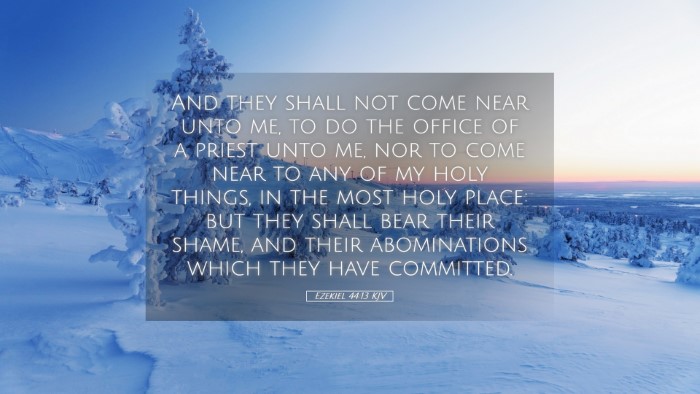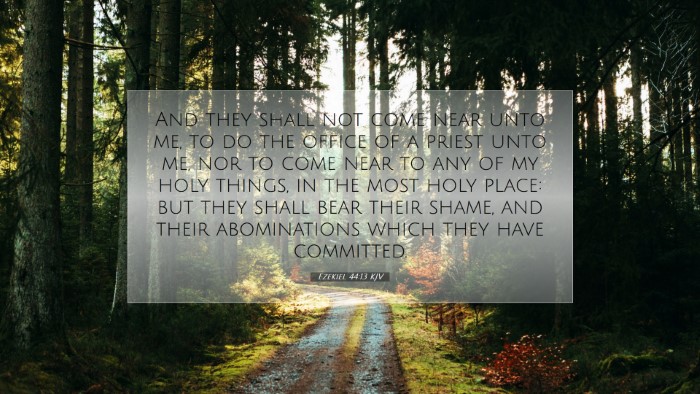Bible Commentary on Ezekiel 44:13
Verse: Ezekiel 44:13: "And they shall not come near unto me, to do the office of a priest unto me, nor to come near to any of my holy things, in the most holy place: but they shall bear their shame, and their abominations which they have committed."
This verse serves as a profound commentary on the qualifications and roles of the Levitical priests in the new temple described by Ezekiel. It highlights the separation of the unfaithful priests from the sacred duties that they once held. To better understand the implications of this verse, we shall draw insights from classical commentators, including Matthew Henry, Albert Barnes, and Adam Clarke.
Analysis from Matthew Henry
Matthew Henry emphasizes the holiness of God and the standards required for service in His temple. He notes the following points:
- Separation from Defilement: The priests who had defiled themselves through idolatry and other abominations are barred from approaching God. This illustrates the principle that spiritual integrity is essential for those in service to God.
- Consequences of Sin: Their shame and the residue of their abominations reflect the serious consequences of unfaithfulness. Henry asserts that unrepentant sin leads to disqualification from sacred duties.
- Restoration through Righteousness: Though these priests are set aside, Henry emphasizes that true repentance could lead to restoration in the future, which aligns with the biblical theme of redemption.
Insights from Albert Barnes
Albert Barnes provides an interpretative framework regarding the roles and responsibilities of the priests in the new temple:
- Priestly Office: Barnes details that the priesthood is not merely an office, but a sacred calling requiring moral and spiritual purity. Only those who remain faithful to God can approach Him in ministerial capacities.
- Holiness of the Temple: The emphasis on not coming near to the holy things underscores the idea that God's presence is not to be taken lightly. The offenders have forfeited their privileges due to their sins against the divine standards.
- Judgment and Accountability: Barnes argues that this verse reflects God's judgment on unfaithful leaders—God holds them accountable for leading His people astray. This is a somber reminder of the importance of righteous leadership.
Reflections from Adam Clarke
Adam Clarke offers a historical and theological perspective that adds depth to the understanding of this scripture:
- Historical Context: Clarke points out that this decree is rooted in the historical failures of the priesthood during tumultuous periods in Israel's history, particularly during the Babylonian captivity.
- Theological Implications: The theological import of being distanced from God’s presence signifies that sin creates a relational barrier between humanity and divinity. Clarke elucidates that the effects of sin are not only personal but communal, affecting the entirety of Israel.
- Path to Restoration: He comments on God's desire for repentance, holding the hope that even those who have stumbled can turn back to Him and find forgiveness, a recurring theme in Ezekiel’s prophecies.
Theological Reflections
Combining the insights from these commentators, several key theological reflections emerge:
- Necessity of Holiness: This text underscores the necessity of holiness in ministry and service. It serves as a stark reminder for today’s church leaders to approach their calling with reverence.
- Consequences of Leadership Failure: There are severe consequences when leaders fail to uphold God’s standards. Those who lead must recognize their weighty responsibility in their spiritual community.
- Hope of Repentance: The elders' former positions are indicative of the potential to redeem the repentant heart. The text is a catalyst for considering themes of grace, repentance, and restoration in the narrative of God’s people.
Conclusion
Ezekiel 44:13 serves as a sobering reminder of God's holiness and the necessary moral and spiritual requirements for those who wish to approach Him in ministry. It speaks volumes about the nature of leadership within the church, emphasizing accountability and the high calling of representing God before others. As we reflect on these insights, may we strive to embody the qualities of holiness, integrity, and faithfulness in our respective roles within the body of Christ.


